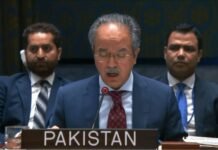Djibouti City, 4 October 2022 (TDI): The 40th Ordinary Session of the Intergovernmental Authority on Development (IGAD) Committee of Ambassadors was held in Djibouti on 3 October. The Ambassador of Ethiopia to Djibouti was also present in the session.
Timeline of session
The Executive Secretary of IGAD, Workneh Gebeyehu, briefed the participants on the organization’s successes and challenges and called for sustained support from member states.
The Committee of Ambassadors welcomed the brief by the Executive Secretary and provided useful suggestions on how to move forward together.
Moreover, the Ambassador of Ethiopia to Djibouti, Berhanu Tsegaye, while speaking at the Ordinary meeting, reaffirmed Ethiopia’s commitment to advancing the region’s security, political, and socioeconomic interests through close collaboration with the IGAD member states.
Intergovernmental Authority on Development (IGAD)
The Intergovernmental Authority on Development (IGAD) was established in Eastern Africa in 1996 to supersede the Intergovernmental Authority on Drought and Development (IGADD) which was founded in 1986.
The aim of IGADD was to mitigate the effects of the recurring severe droughts and other natural disasters that resulted in widespread famine, ecological degradation, and economic hardship in the region.
Countries including Djibouti, Ethiopia, Kenya, Somalia, Sudan, and Uganda took action through the United Nations to establish the intergovernmental body for development and drought control in their region.
Also Read: Joint UNDP-IGAD Workshop commences in Djibouti
Eritrea became the seventh member after its independence in 1993 and South Sudan joined IGAD in 2011 as the eighth member state.
IGAD Vision and Mission
The IGAD’s founding leaders were inspired by a vision of a region in which its citizens would forge a shared identity, live in peace, and enjoy a secure environment while combating poverty with suitable and successful sustainable development initiatives.
The IGAD region stretches has an area of over 5.2 million km square that comprises the countries of Djibouti, Eritrea, Ethiopia, Kenya, Somalia, South Sudan, Sudan, and Uganda.
The region also has about 6960 km of coastline with the Indian Ocean, Gulf of Aden, Gulf of Toudjoura, and the Red Sea.
Student of BS-International Relations at Quaid-i-Azam University








